#asoiafcanonjonsnow
Text
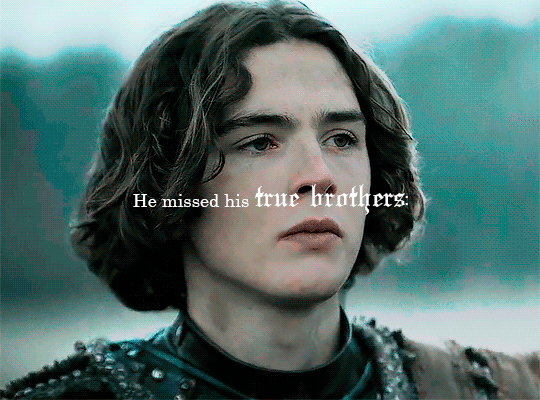


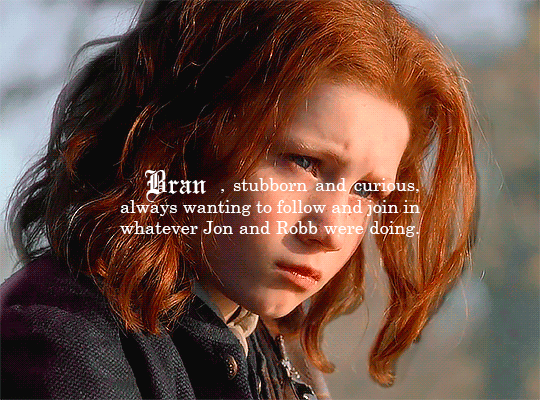

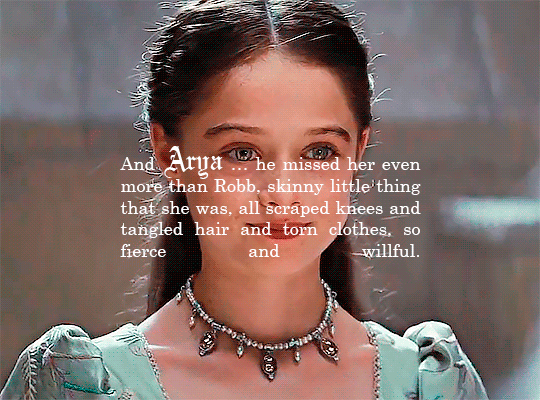
Arya never seemed to fit, no more than he had … yet she could always make Jon smile. He would give anything to be with her now, to muss up her hair once more and watch her make a face, to hear her finish a sentence with him. — Jon Snow III, A Game of Thrones.
#jon snow#asoiafedit#book jon snow#valyrianscrolls#arya stark#sansa stark#rickon stark#robb stark#bran stark#house stark#bookhousestark#thenorthsource#valyriansource#rachel hurd wood#asoiafcanonjonsnow#jonsource#one day i'll remake this gifset. today is not the day lol ☠️#asoiaf#a song of ice and fire#*mine
2K notes
·
View notes
Text


JONSNOWFORTNIGHTEVENT2023
DAY 3: ALTERNATE PROMPT: RIPPLES OF INFLUENCE 🌊🌟
Arya Stark
Everything Syrio Forel had ever taught her vanished in a heartbeat. In that instant of sudden terror, the only lesson Arya could remember was the one Jon Snow had given her, the very first. She stuck him with the pointy end, driving the blade upward with a wild, hysterical strength. - A Game of Thrones - Arya IV
Samwell Tarly
He giggled hysterically, wondering if they would make a wight of him, a huge fat white wight always tripping over its own dead feet. Do it, Sam. Was that Jon, now? Jon was dead. You can do it, you can, just do it. And then he was stumbling forward, falling more than running, really, closing his eyes and shoving the dagger blindly out before him with both hands. - A Storm of Swords - Samwell I
Even in Jon's absence, his influence on those around him is profound. His lessons and encouragement resonate deeply with characters like Arya and Sam, empowering them to fight for their survival and defend themselves in dire situations.
Arya Stark, faced with a moment of terror, finds herself relying on the teachings Jon imparted to her long ago. As everything Syrio Forel taught her seems to vanish from her mind, it is Jon's very first lesson that resurfaces. With a surge of wild, hysterical strength, Arya remembers to "stick them with the pointy end," driving her blade upwards to defend herself. Jon's words become her anchor in a chaotic world.
Similarly, Samwell Tarly, haunted by his own fears, hears Jon's voice echoing in his mind. Despite doubting himself, Sam finds courage in Jon's unwavering belief in him. Encouraged by Jon's memory, Sam pushes through his own self-doubt and blindly charges forward, wielding a dagger to protect himself. Jon's presence, even in memory, becomes the catalyst for Sam's unexpected bravery.
These instances highlight the lasting impact Jon has on those who have crossed paths with him. His wisdom, support, and the lessons he imparts serve as a guiding light for others, empowering them to find strength within themselves and overcome overwhelming challenges.
#Jon Snow#Arya Stark#Samwell Tarly#JonSnowFortnightEvent2023#asoiafcanonjonsnow#ASOS#AGOT#GIF#gameofthronesdaily#canonarya#canonjonsnow#asoiaf#Original Post
163 notes
·
View notes
Text
JON SNOW DAY 8: FEAR AND TRAUMA 😔
The relationship between Catelyn and Jon is one of the most divisive topics within the asoiaf fandom. No matter where you stand on this debate, we can all agree that the influence each character has on the other’s life is a negative one.
Every time I write about this topic I feel the need to say that no, I don’t expect Catelyn to act like a mother to a child that isn’t her own just because the kid is related to her husband. Jon fans often get accused that we want Catelyn to “mother” Jon but frankly there is not a single Jon fan (at least as far as I’m aware of) that believes she’s obligated to do so.
With that being said, there is a difference between acting like a mother and treating a kid with basic decency. Catelyn is failing on the second aspect and fans rightfully call her out on that (same as they do with any character that is horrible other children).
We learn from Jon’s pov that she never calls him by his name. Minutes ago, on the same chapter she calls him “bastard”. Which means that mostly she avoids him, not even acknowledging his presence and that when she has to she’s calling him degrading names like “bastard”.
Her eyes found him. They were full of poison. "I need none of your absolution, bastard."
Jon lowered his eyes. She was cradling one of Bran's hands. He took the other, squeezed it. Fingers like the bones of birds. "Good-bye," he said.
He was at the door when she called out to him. "Jon," she said. He should have kept going, but she had never called him by his name before. He turned to find her looking at his face, as if she were seeing it for the first time.
AGOT, JON II
Do you know how dehumanizing is for a child never to be called by their own name by an adult that lives in their home? And worst, have the same adult calling them degrading names? Catelyn, by the way she treats him, makes sure that Jon feels unwelcome on the only home he’s ever known.
I often see fans dismissing Catelyn’s mistreatment of Jon as simply avoiding him. Which can be harmful on its own but the thing is that Catelyn’s ill treatment goes beyond of that. Jon is terrified of her to the point he kept postponing saying goodbye to a brother he loved (Bran) simply because he knew she would be on the same room. This kind of reaction isn’t born by a kid who simply doesn’t interact with an adult in a position of power. This kind of fear means that some negative interactions between them existed in the past.
The text also supports this, because when Catelyn is irritated by Jon’s presence in Bran’s room she doesn’t simply ignore it. She threatens him that she’ll call the guards aka using her power as the lady of the house to indimidate this powerless teen:
Once that would have sent him running. Once that might even have made him cry. Now it only made him angry. He would be a Sworn Brother of the Night's Watch soon, and face worse dangers than Catelyn Tully Stark. "He's my brother," he said.
"Shall I call the guards?"
AGOT, JON II
Lady Stark has casted a large shadow in Jon’s life. During the years he lived in Winterfeel, he always tried to be quiet, in the shadows. He never wanted to be in the spotlight (despite the fact that we constanly see post- Winterfell Jon wanting to be acknowledged) because that would also draw Catelyn’s attention. He also never felt fully belonging on his own home which was partly due to his stepmother’s mistreatment. Even long after he left Winterfell, he keeps having nightmares where she personfies his fears and insecurites.
Finally, I want to write about Jon’s relationships with his siblings and how Catelyn influences them. I’ve seen fans claiming that Jon had a good relationship with his siblings because Catelyn allowed it to happen but I honestly disagree. In my opinion, Jon has a good relationship with most of his siblings despite Lady Catelyn’s efforts to sabotage them. Canon also supports that with Catelyn speaking to a very young Robb about what makes his half brother different to him, to the point of Robb being agressive about it (something that older Robb who isn’t so easily influenced by his mother would never do):
Only this time, this time, Robb had answered, "You can't be Lord of Winterfell, you're bastard-born. My lady mother says you can't ever be the Lord of Winterfell.”
ASOS, JON XII
Another example of Catelyn ill speaking about Jon to her kids comes when she tries to convince Robb not to name Jon his heir. During that conversation she even compares Jon to Theon (who as far as she knows is responsible for her two other sons’ death) implying that Robb’s half brother is capable of also harming their family:
"Jon would never harm a son of mine."
"No more than Theon Greyjoy would harm Bran or Rickon?"
Grey Wind leapt up atop King Tristifer's crypt, his teeth bared. Robb's own face was cold. "That is as cruel as it is unfair. Jon is no Theon."
ASOS, CATELYN V
Also, I don’t think it’s a coicidence that the child who is closer to Catelyn (Sansa) is also the one who has the most distant relationship with Jon. As Jon once again informs us in his pov, his sister always called him “half brother” instead of simply “brother”:
He missed the girls too, even Sansa, who never called him anything but "my half brother" since she was old enough to understand what bastard meant.
AGOT, JON III
To conclude, Catelyn hating the fact that her husband has cheated on her and has a child born out of his infidelity doesn’t make her an awful person, just a human one. The fact that instead of blaming Ned she has put all the blame to a powerless child is one of her negative traits and fans are justified to call her out on this.
#jonsnowfortnightevent2023#asoiafcanonjonsnow#canonjonsnow#jon snow#house stark#catelyn stark#valyrianscrolls#a post of ice and fire#asoiaf meta#jon snow meta#mymeta
106 notes
·
View notes
Text
JON SNOW FORTNIGHT EVENT 2023
Day 6 - Shadows of Heroism
“Gared was near as old as I am and longer on the Wall,” he went on, “yet it would seem he forswore himself and fled. I should never have believed it, not of him, but Lord Eddard sent me his head from Winterfell. Of Royce, there is no word. One deserter and two men lost, and now Ben Stark too has gone missing.” He sighed deeply. “Who am I to send searching after him? In two years I will be seventy. Too old and too weary for the burden I bear, yet if I set it down, who will pick it up? Alliser Thorne? Bowen Marsh? I would have to be as blind as Maester Aemon not to see what they are. The Night’s Watch has become an army of sullen boys and tired old men. Apart from the men at my table tonight, I have perhaps twenty who can read, and even fewer who can think, or plan, or lead. Once the Watch spent its summers building, and each Lord Commander raised the Wall higher than he found it. Now it is all we can do to stay alive.”
- Tyrion III, AGOT
This fandom rarely ever acknowledges the skills that got Jon his place as Jeor Mormont’s steward - which subsequently marked him as next in line to lead the Watch. It seems that most people think it was purely because of Jon’s identity as a Stark, which doesn’t seem to track with what we’re actually shown in the text.
Because up until this point, Jon didn’t register in Mormont’s conscious.
Mormont frowned through his thick grey beard. “Snow? Oh, the Stark bastard. I think not. The young ones need to forget the lives they left behind them, the brothers and mothers and all that. A visit home would only stir up feelings best left alone. I know these things. My own blood kin … my sister Maege rules Bear Island now, since my son’s dishonor. I have nieces I have never seen.” He took a swallow. “Besides, Jon Snow is only a boy. You shall have three strong swords, to keep you safe.”
Jon is, as of now, just the Stark bastard. That’s all he is. And Mormont can barely recall him in conversation. As far as the Old Bear knows, Jon is merely a privileged lordling who is yet to earn his place at the Wall. And we must recall the tragedy of Waymar Royce, an inexperienced lad who was thrust into a position of leadership a bit too early - something Mormont deeply regrets.
So what tipped the scales in Jon’s favor?
He told them all of it, even the part where he’d set Ghost at Rast’s throat. Maester Aemon listened silently, blind eyes fixed on the fire, but Chett’s face darkened with each word. “Without us to keep him safe, Sam will have no chance,” Jon finished. “He’s hopeless with a sword. My sister Arya could tear him apart, and she’s not yet ten. If Ser Alliser makes him fight, it’s only a matter of time before he’s hurt or killed.”
Chett could stand no more. “I’ve seen this fat boy in the common hall,” he said. “He is a pig, and a hopeless craven as well, if what you say is true.”
“Maybe it is so,” Maester Aemon said. “Tell me, Chett, what would you have us do with such a boy?”
“Leave him where he is,” Chett said. “The Wall is no place for the weak. Let him train until he is ready, no matter how many years that takes. Ser Alliser shall make a man of him or kill him, as the gods will.”
“That’s stupid,” Jon said. He took a deep breath to gather his thoughts. “I remember once I asked Maester Luwin why he wore a chain around his throat.”
Maester Aemon touched his own collar lightly, his bony, wrinkled finger stroking the heavy metal links. “Go on.”
“He told me that a maester’s collar is made of chain to remind him that he is sworn to serve,” Jon said, remembering. “I asked why each link was a different metal. A silver chain would look much finer with his grey robes, I said. Maester Luwin laughed. A maester forges his chain with study, he told me. The different metals are each a different kind of learning, gold for the study of money and accounts, silver for healing, iron for warcraft. And he said there were other meanings as well. The collar is supposed to remind a maester of the realm he serves, isn’t that so? Lords are gold and knights steel, but two links can’t make a chain. You also need silver and iron and lead, tin and copper and bronze and all the rest, and those are farmers and smiths and merchants and the like. A chain needs all sorts of metals, and a land needs all sorts of people.”
Maester Aemon smiled. “And so?”
“The Night’s Watch needs all sorts too. Why else have rangers and stewards and builders? Lord Randyll couldn’t make Sam a warrior, and Ser Alliser won’t either. You can���t hammer tin into iron, no matter how hard you beat it, but that doesn’t mean tin is useless. Why shouldn’t Sam be a steward?”
[…]
Maester Aemon was gentler. “Is your friend a hunter?”
“He hates hunting,” Jon had to admit.
“Can he plow a field?” the maester asked. “Can he drive a wagon or sail a ship? Could he butcher a cow?”
“No.”
Chett gave a nasty laugh. “I’ve seen what happens to soft lordlings when they’re put to work. Set them to churning butter and their hands blister and bleed. Give them an axe to split logs, and they cut off their own foot.”
“I know one thing Sam could do better than anyone.”
“Yes?” Maester Aemon prompted.
Jon glanced warily at Chett, standing beside the door, his boils red and angry. “He could help you,” he said quickly. “He can do sums, and he knows how to read and write. I know Chett can’t read, and Clydas has weak eyes. Sam read every book in his father’s library. He’d be good with the ravens too. Animals seem to like him. Ghost took to him straight off. There’s a lot he could do, besides fighting. The Night’s Watch needs every man. Why kill one, to no end? Make use of him instead.”
Maester Aemon closed his eyes, and for a brief moment Jon was afraid that he had gone to sleep. Finally he said, “Maester Luwin taught you well, Jon Snow. Your mind is as deft as your blade, it would seem.”
- Jon V, AGOT
It must have been Jon advocating for Sam. He told Aemon how he stood up for Sam and led the other recruits in making sure that he wasn’t excluded. He correctly identified that the Watch needs all sorts of people and comes up with a workable solution for Sam’s inclusion. And given that Aemon is one of the higher ranking officers in the Watch, it’s more than possible that he told Mormont of everything Jon had said and done. And Mormont saw in Jon a man who was quick on his feet, knew how to lead and delegate, and knew how to tackle the Watch’s weaknesses, which are identified by Mormont himself a few chapters earlier.
So Jon proved his worth. He proved that he was a man who could inspire and lead, plan ahead, and take action. Remember that by Jon V (when he becomes steward), he has all but taken control of the Watch’s new recruits and become the de factor master at arms (thereby supplanting the thoroughly ineffectual Alliser Thorne). He has also proven that he has an analytical nature by rightfully acknowledging that the Watch lacks learned men like Sam and he tackles that problem by placing Sam near Aemon thereby ensuring that the Watch will always be served by a learned and skilled maester.
Jon is already thinking like a Lord Commander, and he’s only a few weeks in! He knows the Watch’s weakness and correctly identifies how to bypass them. It’s all the more impressive when we note that this is quite early in his AGOT arc, meaning that his ability to plan ahead was not gained on the fly in A Dance with Dragons, but is a skill that he has always had and was slowly developing over time.
#jon snow#the nights watch#jeor mormont#sam tarly#maester aemon#asoiaf#valyrianscrolls#jonsnowfortnightevent2023#asoiafcanonjonsnow#my stuff
71 notes
·
View notes
Text

Day 6- Shadows of Heroism
Jon trying to ensure humanity survives a literal apocalypse
#jon snow#asoiaf#jonsnowfortnightevent2023#asoiaf fanart#asoiafcanonjonsnow#this may not make sense logically#but artistically its what i wanted sooo#have a very late drawing :) but it is still day six so
48 notes
·
View notes
Text
King Jon Stark's Coat of Arms

Was wondering what would Jon's sigil will look like when he becomes King (and he knows his parentage).
His mother's sigil in his father's colors. 👀
44 notes
·
View notes
Note
hey saw your reblog on the Jon Event Post. I am curious what do you think is the relation between Jon and the song 'the last of the giants'?
Hey anon! Thank you for the patience with this ask!
I started writing a response, but it got SO LONG that I decided I will keep the answer here brief and write a longer meta as soon as irl things stop bothering me.
Basically, I believe that some songs in ASOIAF were created by GRRM to fit specific characters – and the text supports that by presenting the song either exclusively or mostly on the POV of said characters.
For example, think about Seasons of My Love. This is a song that GRRM created with Tyrion in mind and he shows that to us by making this song very present in Tyrion's narrative. It's through Tyrion's POV that we learn the lyrics of the song. Tyrion's wife Tysha is shown to have sung this song a lot – and Tysha is a very important presence in Tyrion's story. Seasons of My Love is a song about romance, that's "sad if you understand the lyrics". The lyrics are tied in to Tyrion's wishes (to have a woman that loves him) and can have more than one interpretation of what they mean for Tyrion's future.
When it comes to Last of the Giants, it's a song that was exclusively sang on Jon's POV in ASOS by members of the free folk, who have invaluable presences in Jon's arc. His first love is Ygritte, a woman who sings this song and tells him off when he doesn't grasp the meaning of its lyrics. Another singer is Tormund Giantsbane, who later on becomes friends and political allies with Jon.
Said lyrics are a crucial part of his arc too. The song is about how the titular giants lost their lands to "small folk", who killed them day and night, who exploited the resources, who isolated them from the rest of the world, who don't care about eradicating cultures. It's not hard to understand that this song not only applies to giants, but to the free folk, the children of the forest and to any other marginalized cultures. GRRM is very much a "everyone needs to come together" type of guy, and he uses Jon's relationship with the free folk as one of the main arguments of that belief.
On top of that, the presence of the song at that exact moment in the text (Jon II ASOS) marks a turning point for the free folk. Prior to that chapter, Jon's opinion of the free folk matched that of other people from the rest of Westeros, including the Night's Watch. They were enemies, brutes, cruel raiders, people they had to isolate, someone he had to pretend to be friends and later betray. After that, however, he begins spending time with the free folk and comes to genuinely care for them. He falls in love, makes friends, learns about their culture, realizes they are people just like him and his Night's Watch brothers. When he betrays them, he does it with a lot more regrets. When Ygritte dies, he mourns her, burns her in the customs of the free folk, remembers her. When he becomes Lord Commander, one of his most poignant moves is to bring the free folk to the Wall.
The humanization of the free folk is a crucial part of ASOIAF's narrative because it's a book written by George "We Need To Come Together As Humans" Martin, and the author deliberatily chooses Jon's POV as the main source of that humanization (with important presence of Samwell's POV too!). Why? Because Jon is a hero. Because Jon understands the importance of unity, of abandoning prejudices, of humanizing folks that have been dehumanized.
#jon snow#books#a song of ice and fire#valyrianscrolls#bruna & her asks#anonymous#should i tag asoiafcanonjonsnow? idk lol#this is LONG and the meta will be even longer because I cannot shut up about asoiaf#apologies for any english mistakes... or any incoherences... thinking is HardTM
44 notes
·
View notes
Text
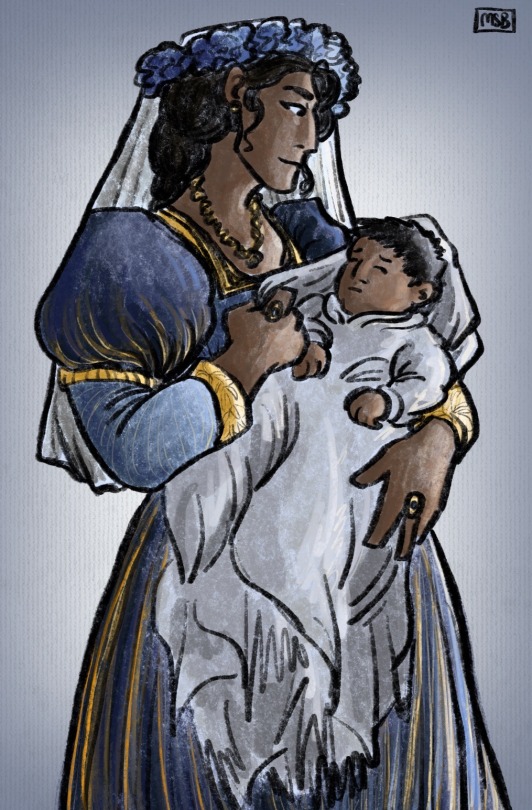
#JonSnowFortnightEvent2023 - @asoiafcanonjonsnow
Day 9 - Wishes and Hopes
He knew nothing of his mother; Eddard Stark would not talk of her. Yet he dreamed of her at times, so often that he could almost see her face. In his dreams, she was beautiful, and highborn, and her eyes were kind.
oh I made myself sad :)
#he looks like her 🥺#also one day I will decide what northern fashion looks like#asoiaf#a song of ice and fire#jon snow#lyanna stark#r+l=j#canonjonsnow#minsart#my art#fanart#valyrianscrolls#jonsnowfortnightevent2023#jon snows mother
325 notes
·
View notes
Text
#JON SNOW FORTNIGHT EVENT 2023 @asoiafcanonjonsnow
DAY 10: ECHOES OF THE PAST 🗝️📜 (1/2) ->
Historical parallels with Medieval bastard Kings.
Nowadays, ‘bastard’ is used as an insult.
Being born to unmarried parents is largely free of the kind of stigma and legal incapacities once attached to it in Western cultures, but it still has echoes of shame and sin. The disparagement of children born outside of marriage is often presumed to be a legacy of medieval Christian Europe, with its emphasis on compliance with Catholic marriage law.
Yet prior to the 13th century, legitimate marriage or its absence was not the key factor in determining quality of birth. Instead, what mattered was the social status of the parents – of the mother as well as of the father. Being born to the right parents, regardless of whether they were married according to the strictures of the church, made a child seem more worthy of inheriting parents’ lands, properties and titles.
It’s not until the late 12th century that evidence for the exclusion of children from succession on the grounds of illegitimate birth first appears. ‘Bastard’, as we now understand it, began to emerge here.
Importantly, this shift in the meaning and implications of illegitimacy did not arise as an imposition of Church doctrine. Instead, ordinary litigants began exploiting bits of Church doctrine to suit their own ends. Perhaps the earliest signs of this can be found in the annals of English legal history, with the Anstey case of the 1160s. This might have been the first time an individual was barred from inheriting because her parents had married illegally. And it happened not because the Church intervened, but because one clever plaintiff figured out how to exploit some scraps of theological doctrine. After that time, more and more plaintiffs began to do the same.
For example, towards the end of the 12th century, a regent countess of Champagne rushed to make use of an allegation of illegitimate birth against her nieces, in an effort to secure her son’s succession. Daughters could inherit in this region, and so these sisters did have a claim to the county once ruled by their late father. But the regent countess denounced the sisters as the product of an illegal marriage and therefore not legitimate heirs of their father. The strategy worked in that both daughters did eventually renounce their claims to the county, but not without first obtaining a great deal of money, enough to make them both extremely wealthy. As this suggests, the papacy had a far more passive role than is often imagined.
As bastardy began to acquire its modern meaning, in the early 13th century, it remained the case that the papacy focused on the regulation of illicit unions rather than the exclusion from succession or inheritance of those born to illicit unions. Hatred of illicit sex did trump dynastic politics on occasion. Hatred of the children born to such unions did not. There is very little evidence to suggest that an interest in keeping illegitimate children from inheriting noble or royal title outweighed political or practical considerations in the same way that the policing of illegal marriages sometimes did.
Understanding the changing meanings of bastardy helps us to arrive at a clearer picture of the workings and priorities of medieval society before the 13th century. Society then did not operate subject to rigid Christian canon law rules. Instead, it measured the value of its leaders based on their claims to celebrated ancestry, and the power attached to that kind of legitimacy. To be sure, marrying legitimately certainly received a good deal of lip service throughout the Middle Ages. Nevertheless, in this pre-13th-century world, the most intense attention was paid not to the formation of legitimate marriages, but to the lineage and respectability of mothers. Only beginning in the second half of the 12th century did birth outside of lawful marriage begin to render a child illegitimate, a ‘bastard’, and as such potentially ineligible to inherit noble or royal title.
Source
Well, George R.R. Martin has been using real life historical events as an inspiration for creating the lore of A Song of Ice and Fire, more concretely English and Western Late Medieval Europe history for Westeros, and it was precisely in the Late Middle Ages when the legal situation for bastards worsened by reinforcing marriage and legitimacy laws, reinforcing concubinates to disappear and laws to avoid any kind of polygamy.
In Westerosi society there's the stigma that comes from being born as a bastard, they're said to be born from lust, lies, and weakness, and as such, they are said to be wanton and treacherous by nature, and although they could get some prominent position either in the Citadel, the Kingsguard, Night's Watch or the Faith, they are generally discriminated by other Westerosi (except in Dorne, where there's tolerance towards bastards) and they rarely inherit his father's titles nor become kings. In the Asoiaf lore, there's recording of a bastard of a Bracken and a Blackwood, Benedict Waters, who founded the House of Justman and became King of the Trident as Benedict I; as well as Alyn Velaryon, a Velaryon bastard who was legitimised and became Lord of the Tides after The Dance of Dragons.
Till the events of the published books, Jon has reached the position as Lord Commander of the Night's Watch and King Beyond the Wall in all but in name, two positions he has been chosen for.
But he would not have the possibility to inherit any title as Lord of Winterfell and Warden of the North/King in the North as a bastard, unless someone legitimised him, like Robb did in his Will. Jon has the chance of standing as a candidate for the Northern Succession Council after defeating the Boltons.
So, if The North stays away from the Iron Throne, Jon would be a good candidate for Lord of Winterfell and King in The North, but the question is... Is there any historical example of bastards who became kings?
Yes, there are, and in this meta we're going to down through history and remember those kings. This list probably doesn't include all of the bastard kings, just a selection, if you know about some more, feel free to share it.
The most common concept for bastardy is a child born of parents who were not married when the child was born, so firstly we'll list a few kings who are included in that group, as we consider Jon as Eddard Stark's bastard or Rhaegar and Lyanna's.
Their circumstances in which those kings got to throne are diverse, but we'll get into them searching for any simmilarities between Jon's story and their lifes.
Let's start, the list is on chonological order, and we'll notice that after the 13th century the amount of bastard kings is less, like we cited at the beginning of this meta.
8th Century
-> Mauregato I of Asturias (719-788), who reigned during the late 8th century, between 783 and 788, and was the son of Alfonso I of Asturias and a Muslim concubine or servant named Sisalda. He took the throne when the nobility had declared his nephew Alfonso II of Asturias as Silo's successor, although he probablyhad support of some parts of the nobility. He wed Creusa and had a son with her, Hermenegildo. Bermudo I was elected as King of Asturias after Mauregato died.
The identity of Mauregato's mother is a bit unclear, but her being a Muslim servant is considered a common statement, so his parents followed religions, Christianism and Islam, like Rhaegar and Lyanna, the Faith and the Old Gods.
Plus as happened to Mauregato, Jon may have some problems of nobles in the Northern Great Council because he's bastard and the other candidates would have support for being legimate, although they are kids, they would need a regent, that could be beneficial for them to control the North if they want to, but maybe some other members of the Council suggest or support Jon as their leader.
11th Century
-> Ramiro I of Aragon (1006/7-1063), natural son of Sancho III of Pamplona and Sancha de Aybar. His father Sancho splited his domains and passed down one of them to his sons; from the offspring she had with his wife Muniadona of Castile: García III inherited the Kingdom of Pamplona, Ferdinand I of Leon inherited the county of Castile and Gonzalo inherited the counties of Ribagorza & Sobrarbe; and Ramiro received the county of Aragon, and he annexed the counties of Ribagorza & Sobrarbe Gonzalo died. He unified the three counties to create the Kingdom of Aragon. His relationship with his siblings was complex, due to the rivalry between them for their kingdoms, initially Ramiro tried to conquer Pamplona but he was defeated by García III, and later Ramiro allied with García and his son Sancho IV against Ferdinand I.
His reign lasted 28 years.
Ramiro married Ermesinda of Foix and Agnes of Aquitaine, their offspring was: Sancho I of Aragon & V of Pamplona, Sancha, García, Urraca and Theresa, and he had a son named Sancho out of wedlock.
-> Magnus I " the Good" of Norway and Denmark (1024 - 1047), son of Olaf II of Norway and English concubine named Alvhild. His reign lasted 12 years. When he was 4 year old, his father was dethroned by Cnut the Great, and then his family travelled through other courts seeking shelter but finally they stablished in at the court of the Grand Prince Yaroslav I of Novgorod, where he grew up, was trained as a warrior and was educated in Old Russian and Greek. Olaf was killed when he reurned to Scandinavia to fight for the throne. When Cnut left for England wife Ælfgifu and their son Svein as regents, Magnus and his supporters return to Norway and he was proclaimed king of Norway. Another son of Cnut, Harthacnut of Denmark, reclaimed Norway, but after Harthacnut died Magnus took his kingdom, but he had to face another pretender Sweyn II, Cnut's nephew, whom Magnus battled against using his father's battle axe, Hel, and he was successful, but died, and Sweyn II succeeded him as King of Denmark and Harald III as King of Norway.
-> William I the Conqueror (1028-1087), illegitimate son of Duke Robert I of Normandy and Herleva of Falaise. He was duke of Normandy and conqueror and king of England.
He started the conquest of England after his cousin, Edward the Confessor died without issue, and Harold II inherited the English throne, but he was defeated and William became the first king of England of the House of Normandy.
William and his wife Matilda of Flanders had 9 children: Robert I of Normandy, Richard, William II of England, Henry I ofEngland, Adelaide, Cecily, Matilda, Constance and Adela .
William seems to be the inspiration for Aegon I the Conqueror and his bastard brother Orys Baratheon, but he could have in common with Jon in becoming kings after their cousins died without issue (i.e. Robb) and having to defeat someone else to become kings, i.e. Jon helping Stannis to defeat the Boltons.
-> Harald III "Hen" of Denmark (1040-1080), illegitimate son of Sweyn II of Denmark and a concubine, Thora.
After Sweyn II died, Harald got elected over his brother Cnut by an assembly, and faced opposition from his brothers during his reign. He ruled over 6 years, he's known to be a peaceful ruler and introduced some monetary and legal reforms like substituting trial by combat or trial by ordeal and replace it with avsystem used by the English of calling upon honorable men to swear oaths on behalf of the parties in a trial.
Harald was married to his cousin Margareta Hasbjörnsdatter, but did not leave any heirs, and was succeeded by his brother Canute IV.
-> Cnut IV "the Holy" of Denmark (1040-1086), illegitimate son of Sweyn II of Denmark with an unknown concubine. He succeeded his brother Harald.
Cnut is considered an ambitious and strict king, ruled during 6 years, limited the power of the nobility, gave great concession and donations to the Church, and took the property of a great quantity of common land for himself or the Church. He raided England a few times and created a fleet to invade it, since he considered William I an usurper, but on his way to lead the invasion, he was killed during a peasant revolt.
After he died, he was succeeded by his brother Olaf I of Denmark.
Cnut married Adela of Flanders. They had three children: Charles I of Flanders and the twin sisters Cæcilia and Ingerid. Ingerid's descendants, the House of Bjelbo, would ascend to the throne of Sweden and Norway and Canute IV's blood returned to the Danish throne in the person of Olaf II of Denmark.
->Olaf I "Hunger" of Denmark (c. 1050 – 1095) illegitimate son of Sweyn II of Denmark with an unknown concubine.
In his early years he was set aside and mistreatred and exiled by his brothers, who Ferrer he could be a political rival against them.
He succeeded his brother Cnut IV, and his reign lasted 9 years, that were plagued by several consecutive years of crop failure and famine.
Olaf married Ingegard of Norway, they didn't have any offspring, so he was succeeded by his brother Erik I.
11th Century/12th Century
-> Erik I " Evergood" of Denmark (c. 1060 – 1103), illegitimate son of Sweyn II of Denmark with an unknown concubine.
When he was young he was a supporter of his brother Cnut IV. After Olaf died, Erik was elected as new king.
Erik reign lasted 8 years, he was well liked by people, he was considered a strapping young man and a good speaker and diplomat, and ruthless towards pirates and robbers. Erik had a reputation as a loud man who liked parties, and even killed four of his men while he was drunken during one of his parties, and so he procced to go on pilgrimsge to Holy Land, journey in which he died. His brother Niels succeeded him.
Erik married Boedil Thurgotsdatter and had one legitimate son with her, Canute Lavard, father of Vademar I of Denmark. Eric had four children out of wedlock, Erik II of Denmark, Benedict, Harald Kesja and Ragnhilde, mother of Erik III of Denmark.
-> Niels I of Denmark (c. 1065 – 25 June 1134) illegitimate son of Sweyn II of Denmark with an unknown concubine. He was the last son of Sweyn to become king.
He was described as mild and forthcoming, though not a competent ruler.
Niels married Margaret Fredkulla, and had two children with her, Inge Nielsen and Magnus I of Sweden. He had a daughter born out of wedlock, Ingerd of Denmark.
During the majority of Niels' reign, 30 years, Denmark had internal peace, only broken when his son Magnus was forced from the Swedish throne and a conflict erupted between Magnus and his cousin Cnut Lavard, due to his popularity. After Magnus slew Cnut, Erik II took his brother's place in the conflict, and Niels supported Magnus.
Niels and Magnus died during the civil war and Erik II became king of Denmark.
-> Erik II "the Memorable" of Denmark (c. 1090– 1137 ), illegitimate son of Eric I of Denmark with an unknown concubine.
Erik the Memorable rebelled against his uncle Niels, and was declared king in 1134.
He punished his adversaries severely, and rewarded his supporters handsomely, as he was considered a harsh and unpopular ruler, he only ruled Denmark 3 years. He was killed by a subject in 1137 and was promptly succeeded by his nephew Erik III of Denmark.
Erik married Malmfred of Kiev, they had no issue, but Erik had a son with his concubine Thunna, Sweyn III of Denmark.
12th Century
-> Sweyn III of Denmark (1125-1157), illegitimate son of Erik II of Denmark and a concubine named Thunna.
He was elected king after Erik III of Denmark abdicated.
In 1154, Sweyn was overthrown by an alliance between Canute and Valdemar, who was crowned Canute's co-ruler as Valdemar.
This prompted the Danish magnates to force through a tripartition of the kingdom into Jutland, Zealand, and Scania. Sweyn chose first, and was made the ruler of Scania.
After that Sweyn organised apeace banquet, in which Sweyn planned on killing his two co-rulers, and succeeded in having Canute killed, but Valdemar escaped. After that Valdemar and Sweyn battled, Sweyn was killed while he was scaping from the battle. Valdemar I was proclaimed king of all Denmark.
Sweyn married Adela of Meissen, daughter of Conrad, Margrave of Meissen, and Luitgard of Ravenstein. They had two children Erik and Luitgard, who married Berthold I of Istria.
->Tancred I of Sicily ( 1138 – 1194), or Tancred of Lecce, illegitimate son of Roger III, duke of Apulia, eldest son of Roger II of Sicily, and his mistress Emma of Lecce.
Tancred was born in Lecce and inherited the county from his grandfather.
With his bastard uncle Simon plotted to remove William II, legitimate son of Roger II, but failed and went to exile.
Years after, Tancred returned to Sicily he swore fealty to his aunt Constance I as William II's heiress, Tancred rebelled and was crowned as King of Sicily. Constance I and her husband the Holy Roman Emperor Henry IV fought against Tancred. Tancred died during the war after 5 years of reign, and was briefly succeeded by his son William III, who was soon captured and executed by orders of Henry IV.
Tancred had married Sybilla of Acerra, an their children were: Roger III, William III, Elvira, Constance, Medania and Valdrada.
13th Century
->Manfred I of Sicily (1232 – 1266), natural son of Holy Roman Emperor Frederick II with Bianca Lancia, legitimised later by his father.
Manfred became regent over the kingdom of Sicily on behalf of his nephew Conradin. As regent he subdued rebellions in the kingdom, until in 1258 he usurped Conradin's rule. After an initial attempt to appease Pope Innocent IV he took up the ongoing conflict between the Hohenstaufens and the papacy through combat and political alliances. He defeated the papal army at Foggia. Manfred was excommunicated by three successive popes, Manfred was the target of a Crusade called by the Popes Alexander IV and Urban IV.
Urban received the help of Charles of Anjou in overthrowing Manfred. Manfred was killed during his defeat by Charles at the Battle of Benevento, and Charles became King of Sicily as Charles I after having executed Conradin.
Manfred had married Beatrice of Savoy and Helena Angelina Doukaina, their children were Constance II of Sicily, Beatrice, Henry, Anselm and Frederick. He also had an illegitimate daughter, Flordelis.
His daughter Constance II married Peter III of Aragon, and with their supporters in the island of Sicily fought against Charles I, who, of the whole kingdom (the Kingdom of Sicily in that period was formed by Naples and the island of Sicily) now controlled only Naples, and Constance II and her children gained Sicily, that later became part of the Crown of Aragon, and their descendants Kings of Aragon annexed Naples some generations later, and Naples and Sicily were ruled by the same king again under the reigns of Alfonso V and his nephew Ferdinand II of Aragon & his descendants.
14th Century
-> Henry II "the Fratricidal" of Castile (1334-1379), or Henry of Trastámara, illegitimate son of Alfonso XI of Castile and his mistress Leonor de Guzmán.
Henry was the fourth of ten illegitimate children of King Alfonso XI of Castile and Eleanor de Guzmán, a great-granddaughter of Alfonso IX of León. He was born a twin to Fadrique Alfonso, Lord of Haro, and was the first boy born to the couple that survived to adulthood.
At birth, he was adopted by Rodrigo Álvarez de las Asturias. Rodrigo died the following year and Henry inherited his lordship of Noreña. His father later made him Count of Trastámara and lord over Lemos and Sarria in Galicia, and the towns of Cabrera and Ribera, which constituted a large and important heritage in the northwest of the peninsula. It made him the head of the new Trastámara dynasty, a bastard branch from the Castilian branch of House Burgundy.
Alfonso XI gave Eleanor many titles and privileges for their children. This caused discontent among many of the noblemen and in particular the queen, Maria of Portugal, and her son Peter I of Castile.
When Peter I succeeded his father, Henry and his siblings revolted several times and were on a intermittent wars during Peter I's reign, in which Henry was supported by Peter IV of Aragon and Charles V of France.
Henry had numerous lovers, Leonor Álvarez, Elvira Íñiguez, Beatriz Fernández, Beatriz Ponce de León y Jérica, Juana de Sousa, Juana de Cárcamo and Juana de Cifuentes, and had in total 13 bastard children: Alfonso, Eleanor, Joanna, Constance, Ferdinand, Mary, Fadrique, Beatrice, Henry, Peter, Isabella, Inés and Joanna.
Henry married Juana Manuel de Villena and they had three children, John I of Castile, Eleanor and Joanna.
In 1369 Henry II defeated and killed his brother Peter I, and became the first king of House Trastámara. During his 10 year reign he faced opposition from Ferdinand I of Portugal and Constance of Castile, Peter I's daughter, and her husband John of Gaunt. Henry II was succeeded by his son John I of Castile
Due to his alliance with Peter IV of Aragon, John I of Castile wed Peter's daughter, Eleanor of Aragon, two of his children were Henry III of Castile and Ferdinand I of Aragon, and so House Trastámara ruled over the Crowns of Castile and Aragon.
14th Century/15th Century
->John I "of Fond Memory" or "the Great" or "the Good" of Portugal (1357-1433), John of Avis, natural son of Peter I of Portugal and Teresa Guille Lourenço. He's the founder and first king of House of Avis, bastard branch from the Portuguese branch of House Burgundy.
His first important charge was Great Master of the Order of Avis, and years after, when Succession Crisis broke out, John ended up being crowned as King of Portugal. John I ruled Portugal over 48 years, the most extensive reign of all Portuguese monarch, and m9st of its reign was able to rule in peace and concentrate on the economic development and territorial expansion. He was succeeded by his son Edward I of Portugal.
It maybe a coincidence, but it's interesting the contrast between Jon and Ramsay, both being Northern bastards, but Ramsay it's like the personification of the Westerosi prejudices against bastards, Ramsay Bolton was legitimised and became his father's heir because he (allegedly) poisoned and killed his trueborn brother Domeric, meanwhile Jon will be KITN because Robb died due to the Bolton-Frey treason and in his will he legitimised and declared Jon as his heir, and in that way there's the parallel between Jon and Ramsay and John I of Portugal and Henry II of Castile, John seemed to have a good relationship with his brother Ferdinand I of Portugal and after the Succession war he became the next king, and Henry II didn't get along with his brother Peter I and he became king after he killed him.
This is a brief introduction, the next part of the meta it'll be dedicated fully to John I of Portugal and his parallels with Jon Snow.
15th Century
->Ferdinand I of Naples (1423-1494), illegitimate son of Alfonso V of Aragon and his mistress Gueraldona Carlino. Ferdinand I of Naples was named after his grandfather Ferdinand I of Aragon, first king of Crown of Aragon from House Trastámara.
His father had conquered Naples after defeating René I and stablished in Naples during most of the rest of his life there since he left in charge his wife and cousin Mary of Castile and his brother John for the government of Aragon when he was away in Italy. Alfonso didn't have legitimate children, he only had three children with his mistress, Ferdinand being the eldest.
So, Alfonso managed to declare his son as heir of Naples, with some alliances with the local nobility, like a marriage between Ferdinand and Isabella of Chiaramonte, and the rest of the Crown of Aragon was inherited by John II of Aragon.
Ferdinand I had to face opposition from foregain royalty and nobility and some local barons who didn't accept Ferdinand' reforms and ambitions and because he was a bastard and he limited they power, and often allied against him, like Pope Callixtus III, John of Anjou, Mariano Marzano, the Angevines, his cousin Charles of Viana (John's II eldest son, although John II accepted his nephew's kingship), among others.
John II of Aragon sent a fleet to support of his nephew against the Angevines, and when the Catalan nobility offered the Aragonese crown to René I during the Catalan civil war, sent troops in support.
Ferdinand had married Isabella of Taranto and his cousin Joanna of Aragon, their offspring was Alfonso II of Naples, Eleanor, Frederick I of Naples, John, Beatrice, Francesco and Joanna, who married his nephew Ferdinand II of Naples.
He had several children with his mistresses Diana Guardato, Marchesella Spitzata, Piscicella Piscicelli, Eulalia Ravignano and Giovannella Caracciolo: Mary, Joanna, Ilaria, Henry, Mary, Alonso, Cesare, Maria Cecilia, Lucrezia, Ferdinand, Mary and Joanna.
He was a very passionate man, he had an almost pathological attraction towards young women and, despite the numerous lovers and concubines, he loved very much his wife Isabella of Taranto, a woman of exceptional virtues, whose death greatly afflicted him. As a father he was very present and very fond of his offspring, especially known is the strong affection shown for his daughters.
Despite the odds, Ferdinand I ruled Naples during 36 years and brought peace and prosperity to Naples, although he had to deal with opponent powers like the Ottoman Empire, France, the Republic of Venice and the Papal States.
He was one of the most influential and feared monarchs in Europe at the time and an important figure of the Italian Renaissance, Ferdinand promoted Renaissance culture and art with his patronage, surrounding himself with numerous artists and writers who flourished in his kingdom, introducted the art of silk and printing, the King showed enthusiasm for music and established in Naples the first musical school in Italy and one of the first in Europe. Ferdinand expanded the very rich royal library founded by his father in Castel Capuano and grow at an impressive rate, thanks to purchases, gifts and the confiscation of the collections of the rebel barons.
He issued various social laws that undermined the excessive power of the Barons, favoring small artisans and peasants. This work of modernization and the resistance he put up against them led to the outbreak of the famous revolt which was subsequently suffocated.
Recognized as one of the most powerful political minds of the time, a very skilled diplomat, stablished the hegemony of Naples over other Italian states, and a dense network of alliances and relationships with Italian and foreign sovereigns, through marriages of his illegitimate and legitimate and children.
After Ferdinand died he was succeeded by his son Alfonso II of Naples, who in turn abdicated very soon in favor of his own son Ferdinand II of Naples.
To expand the list, there's another case of bastardy, in which their parents' marriage was declared null or invalid, if we're considering the possibility that Rhaegar and Lyanna secretly and it could be considered invalid because Rhaegar was already married to Elia and maybe the lack of credible witness make that the wedding could be considered questionable, so for a great sector of the society would be considered a bastard (i.e. The Faith).
9th Century/10th Century
->Athelstan of England (894-939), first king of England, son Edward of Wessex and Egwina. Their parents married, but due to his mother low status, their marriage got annulled. Athelstan succeeded to the throne of Wessex after his brother King Ethelweard, son of Edward and Ælfflæd of Wessex, died.
Aethelstan is known for being a great diplomat, strategist and reformer, created a strong system of alliances, istarted being king of Wessex and anexxed the other six English kingdoms: Northumbria, Mercia, East Anglia, Kent, Sussex and Essex. He never wed and ha no children, so after he died, his brother Edmund I, eldest son of Edward and his third wife, Edgiva, succeeded him.
The English Heptarchy seems to be the inspiration for the Seven Kingdoms, and it's an interesting datail that a bastard from a kingdom, started becoming king of that kingdom and then he ruled the seven kingdoms , as Jon could be proclaimed King in the North, for fighting the Others, he'll have to try to convince and unify the rest of Westeros to survive the War for the Dawn.
11th Century
->Harold I of England (1016-1040), son of Cnut the Great, King of Denmark, Norway, Sweden & England, and Ælfgifu Ælfhelmsdotter. His parents got married by the Danish law, but once Cnut converted to Cristianism and conquered England, married Emma of Normandy, who was considered as his only wife by the Church. Harthacnut, son of Cnut and Emma, left Harold as regent of England while he was away, and later Harold was proclaimed king of England. Harold ruled for four years and sixteen weeks, when he died, Harthacnut took the control of the English throne. Harold married Ælfgifu, and had a son, Ælfwine, but he became a monk.
One of the speculations within the fandom about Rhaegar and Lyanna is that there could have been a secret wedding, maybe it could have been in front of a weirwood in the Isle of Faces following the Northern wedding custumes, in contrast of Rhaegar marring Elia by the Faith of the Seven ceremony.
12th Century/13th Century
->Ferdinand III " the Saint" of Castile ( 1199/1201 – 1252), son of Alfonso IX of Leon and Berenguela I of Castile, their marriage was annulled due to the consanguinity between them. He's the first king of the Crown of Castile, his reign lasted 35 years. Ferdinand III married Beatrice of Swabia and Joan of Dammartin. His children were: Alfonso X "The Wise" of Castile, Fadrique, Ferdinand, Eleonor, Berenguela, Henry, Philip, Manuel, Mary, Ferdinand, Eleonor, Louis, Simon and John.
13th Century/14th Century
->Ferdinand IV "the Summoned" of Castile (1285 - 1312), son of Sancho IV of Castile and Maria de Molina, their marriage got annulled due to consanguinity and because Sancho was betrothed to another woman, although Pope Boniface VIII legitimised Sancho and Maria union when Ferdinand IV was already king. His reign lasted 16 years. Ferdinand IV married Constance of Portugal, their children were: Alfonso XI of Castile and Eleonor of Castile, wife of Alfonso IV of Aragon.
15th Century
-> Edward V of England (1470-1483), eldest son of Edward IV of England and Elizabeth Woodville. His siblings and him were declared as bastards by their uncle Richard III alleged that Edward and Elizabeth was null because there was a promise of marriage from Edward IV to Eleanor Talbot, to get his nephew out of succession. He didn't married and had children since he was 12 when he died.
In this case, Edward V's circumstances seems to have inspired Joffrey's as well as Young Griff and Bran's partially. Stannis states that Joffrey, Myrcella and Tommen are bastards and claims to be the rightful king of Westeros, like Richard III did with his brother's children and now he's trying to make it to the Iron Throne; Bran's part could be inspired by the Princes in the Tower event, in which Edward and his younger brother Richard were imprisioned and probably killed by orders of their uncle, and there were rumors during the following years that maybe one of the brothers scaped, fuelled with pretenders who claimed to be some of the princes, like Perkin Warbeck. In ASOIAF, Theon captures Winterfell and kills the miller's sons to pretend he has killed Bran and Rickon, although they had escaped and in the future the rest of The North is going to know they alived when they return to Winterfell; Young Griff claims to be Aegon VI, Rhaegar and Elia's baby son who was murdered by The Mountain during the Sack of King's Landing
In summary, after reading about the lives of these kings on the list, in many of them we can note the pattern of being elected in an assembly like the Danish kings or having to face adversaries that undermine their positions as kings for being bastards, sometimes by other relatives pretenders or the Church, like happened to most of them. And those are a couple of events that may happen to Jon in the future books, his rising to kingship probably being elected at the Northern Assembly, probably making negotiatons with the supporters of his other siblings i.e. Rickon being supported by the Manderlys, Sansa by Littlefinger and the Vale etc, but Jon could have the support of the Mountain Clans, the Mormonts, the Glovers, House Thenn and The Free Folk.
The meta doesn't end here, for the parallels between Jon and John I of Portugal click here.
#jonsnowfortnightevent2023#jonsnowfortnightevent#jon snow#day 10#echoes of the past#medieval bastard kings#historical parallels#canonjonsnow#canonjon#asoiaf meta#jon snow meta#william the conqueror#john i of portugal#tancred i of sicily#magnus i of norway#cnut iv of denmark#eric ii of denmark#svend iii of denmark#manfred i of sicily#ferdinand i of naples#henry ii of castile#ramiro i of aragon#mauregato i of asturias#harold i of england#ferdinand iii of castile#ferdinand iv of castile#aethelstan of england#olaf i of denmark#niels i of denmark#harald iii of denmark
64 notes
·
View notes
Text


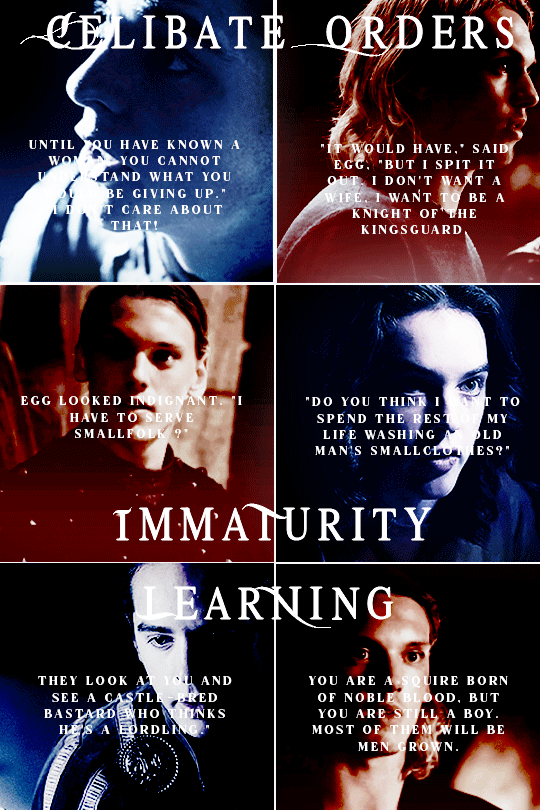




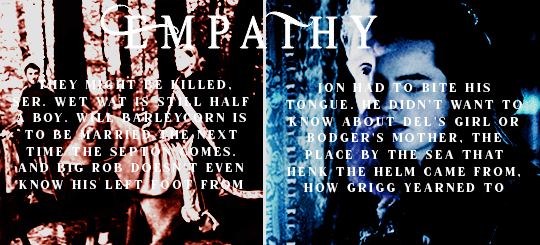
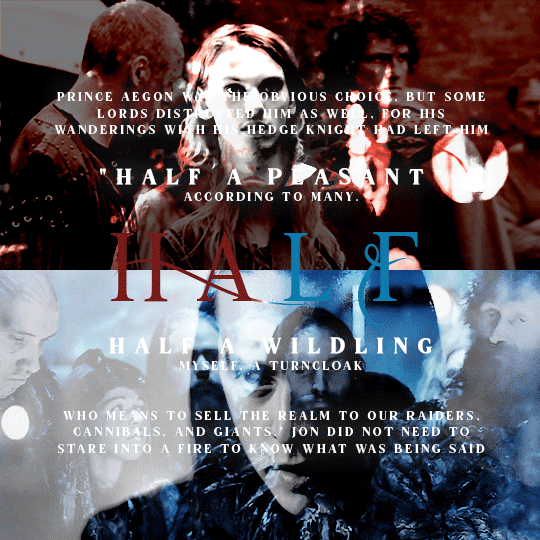

JONSNOWFORTNIGHTEVENT2023
DAY 12: HOUSE TARGARYEN 🐉🏰: Jon Snow // Aegon V Targaryen
Hidden Identity
For the rest of his life—however long that might be—he would be condemned to be an outsider, the silent man standing in the shadows who dares not speak his true name. Jon IX, AGOT
"To keep my hair shaved or dyed, and tell no man my true name," the boy said, with obvious reluctance. The Sworn Sword
Perceptive
"Father took the king down to the crypts this afternoon. The queen didn't want him to go." Benjen gave Jon a careful, measuring look. "You don't miss much, do you, Jon? Jon I, AGOT
He flicked the gold coin back to Ser Uthor. Traitor's gold. Blackfyre gold. Egg said this was a traitor's tourney, but I would not listen. He owed the boy an apology. The Mystery Knight
Celibate Orders
"I want to serve in the Night's Watch, Uncle." "You are a boy of fourteen," Benjen said. "Not a man, not yet. Until you have known a woman, you cannot understand what you would be giving up." "I don't care about that!" Jon said hotly. Jon I, AGOT
"It would have," said Egg, "but I spit it out. I don't want a wife, I want to be a knight of the Kingsguard, and live only to serve and defend the king. The Kingsguard are sworn not to wed." "That's a noble thing, but when you're older you may find you'd sooner have a girl than a white cloak." The Sworn Sword
Immaturity
"There is no shame in being a steward," Sam said. "Do you think I want to spend the rest of my life washing an old man's smallclothes?" Jon VI, AGOT
So had Dunk. "We'll see how many men turn up at the tower . . . but whether it's five or fifty, you'll need to do for them as well."
Egg looked indignant. "I have to serve smallfolk?" The Sworn Sword
Learning
"No. They hate you because you act like you're better than they are. They look at you and see a castle-bred bastard who thinks he's a lordling." Jon III, AGOT
You are a squire born of noble blood, but you are still a boy. Most of them will be men grown. A man has his pride, no matter how lowborn he may be. The Sworn Sword
Growth
Jon smiled at him. "I'm sorry about your wrist. Robb used the same move on me once, only with a wooden blade. It hurt like seven hells, but yours must be worse. Look, if you want, I can show you how to defend that." Jon III, AGOT
The boy considered for a moment. “I could teach them the arms of the great Houses, and how Queen Alysanne convinced King Jaehaerys to abolish the first night. And they could teach me which weeds are best for making poisons, and whether those green berries are safe to eat.” – The Sworn Sword
Stableboy
She might mistake him for a stableboy and hand him the reins of her horse. Jon ADWD.
Your stableboy can stay with the horses.” "I’m a squire, not a stableboy,” Egg insisted. “Are you blind, or only stupid?” The Sworn Sword.
Sharp Tongue
"I'd have an easier time teaching a wolf to juggle than you will training this aurochs."
"I'll take that wager, Ser Alliser," Jon said. "I'd love to see Ghost juggle." Jon III, AGOT
"I have my faith to warm me." The red woman walked beside Jon down the steps. "His Grace is growing fond of you." - Jon I, ADWD
"I can tell. He only threatened to behead me twice." Jon IX, ASOS
Slynt slammed a fist on the table. "I heard you! Ser Alliser had your measure true enough, it seems. You lie through your bastard's teeth. Well, I will not suffer it. I will not! You might have fooled this crippled blacksmith, but not Janos Slynt! Oh, no. Janos Slynt does not swallow lies so easily. Did you think my skull was stuffed with cabbage?"
"I don't know what your skull is stuffed with. My lord."
"Wild boar," said Dunk in a glum tone, "but who wants boar when we have good salt beef?" Egg made a face. "Can I please eat my boots instead, ser? I'll make a new pair out of the salt beef. It's tougher." The Mystery Knight
Unlikely Choices
"I am lord commander because my brothers chose me." There were mornings when Jon Snow did not quite believe it himself, when he woke up thinking surely this was some mad dream. Jon I, ADWD
Soon thereafter, the "Prince Who Was An Egg" was chosen by a majority of the Great Council. The fourth son of a fourth son, Aegon V would become widely known as Aegon the Unlikely for having stood so far out of the succession in his youth. Maeker I, The World of Ice and Fire
Maester Aemon
"Allow me to give my lord one last piece of counsel," the old man had said, "the same counsel that I once gave my brother when we parted for the last time. He was three-and-thirty when the Great Council chose him to mount the Iron Throne…Egg had an innocence to him, a sweetness we all loved. Kill the boy within you, I told him the day I took ship for the Wall. It takes a man to rule. An Aegon, not an Egg. Kill the boy and let the man be born." The old man felt Jon’s face. "You are half the age that Egg was, and your own burden is a crueler one, I fear.You will have little joy of your command, but I think you have the strength in you to do the things that must be done. Kill the boy, Jon Snow. Winter is almost upon us. Kill the boy and let the man be born. Jon ADWD.
Empathy
Jon had to bite his tongue. He didn't want to know about Del's girl or Bodger's mother, the place by the sea that Henk the Helm came from, how Grigg yearned to visit the green men on the Isle of Faces, or the time a moose had chased Toefinger up a tree. He didn't want to hear about the boil on Big Boil's arse, how much ale Stone Thumbs could drink, or how Quort's little brother had begged him not to go with Jarl. Jon V, ASOS
"They might be killed, ser. Wet Wat is still half a boy. Will Barleycorn is to be married the next time the septon comes. And Big Rob doesn't even know his left foot from his right."
Half
"—that I am half a wildling myself, a turncloak who means to sell the realm to our raiders, cannibals, and giants." Jon did not need to stare into a fire to know what was being said of him. Jon VIII, A Dance With Dragons
Prince Aegon was the obvious choice, but some lords distrusted him as well, for his wanderings with his hedge knight had left him "half a peasant," according to many. The World of Ice and Fire
Maekar I
Reformers
"The wildlings will remain upon the Wall," Jon assured them. "Most will be housed in one of our abandoned castles." The Watch now had garrisons at Icemark, Long Barrow, Sable Hall, Greyguard, and Deep Lake, all badly undermanned, but ten castles still stood empty and abandoned. "Men with wives and children, all orphan girls and any orphan boys below the age of ten, old women, widowed mothers, any woman who does not care to fight. The spearwives we'll send to Long Barrow to join their sisters, single men to the other forts we've reopened. Those who take the black will remain here, or be posted to Eastwatch or the Shadow Tower. Tormund will take Oakenshield as his seat, to keep him close at hand."
He enacted numerous reforms and granted rights and protections to the commons that they had never known before. – The World of Ice and Fire
Face Opposition
Marsh flushed a deeper shade of red. "The lord commander must pardon my bluntness, but I have no softer way to say this. What you propose is nothing less than treason. For eight thousand years the men of the Night's Watch have stood upon the Wall and fought these wildlings. Now you mean to let them pass, to shelter them in our castles, to feed them and clothe them and teach them how to fight. Lord Snow, must I remind you? You swore an oath."
...but each of these measures provoked fierce opposition and sometimes open defiance amongst the lords. The most outspoken of his foes went so far as to denounce Aegon V as a "bloodyhanded tyrant intent on depriving us of our gods-given rights and liberties." – The World of Ice and Fire
#Jon Snow#asoiafcanonjonsnow#jonsnowfortnightevent2023#canonjonsnow#Aegon V Targaryen#GIF#ASOIAF#A Song of Ice and Fire#valyrian scrolls#Original Post#valyrianscrolls#jonsnowedit#House Stark#House Targaryen#AGOT#AFFC#ACOK#ASOS#Dunk and Egg#A World of Ice and Fire#The Sworn Sword#Maester Aemon
160 notes
·
View notes
Text
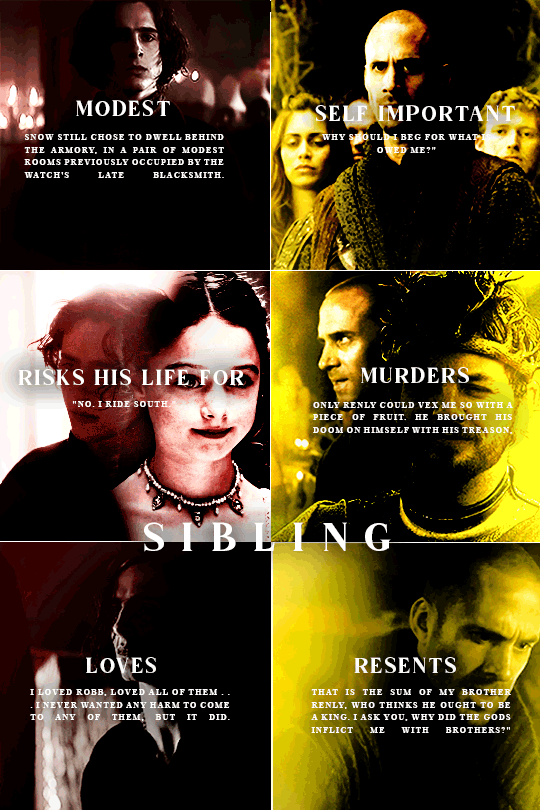


JONSNOWFORTNIGHTEVENT2023
DAY 7: FOILS AND ADVERSARIES: Stannis Baratheon
#jon snow#JonSnowFortNightEvent2023#asoiafcanonjonsnow#canonjonsnow#Stannis Baratheon#GIF#ADWD#AGOT#ASOS#ACOK#R+L=J#ASOIAF#A Song of Ice and Fire#valyrian scrolls#valyrianscrolls#Melisandre#Azor Ahai#Prophecy#Original Post
151 notes
·
View notes
Text

📣 PRE-ANNOUNCEMENT POST: Join the Jon Snow Fortnight Event! 🐺🌹
📢 Calling all fans of Jon Snow! Prepare your keyboards and ready your creative spirits because an epic event is coming your way. We are thrilled to announce the Jon Snow Fortnight Event. Get ready to immerse yourself in the world of our beloved Lord Commander and his unforgettable journey.
📅 Clear your calendars from July 16th to July 31st, because we're about to embark on a full-on Jon Snow extravaganza! It's two weeks of non-stop celebration dedicated to everything and anything related to the one and only Jon Snow. Unleash your thoughts, theories, and fan creations about this iconic character who has stolen our hearts and given us endless chills (the good kind, of course). And guess what? We're kicking off this wild celebration with an artwork that will have you howling like a direwolf at the moon, courtesy of the immensely talented @imjustapoorwayfaringgeek!
🖌️ Feast your eyes on the masterpiece, folks! Jon Snow donning a party hat, looking like he's been through seven hells and back but still ready to party. And by his side, the trusty, fearsome Ghost, the fluffiest sidekick this side of Westeros. And who's causing mischief on his shoulder? None other than Mormont's raven, attempting to nibble on our esteemed Lord Commander's party hat (even though it's definitely not corn!). It's a visual feast that perfectly captures the essence of Jon's world—where duty, celebration, and the occasional feathered drama converge.
🌹 Look closely, my friends, and you'll spot the enchanting Winter Roses in Jon's grip, carefully procured and bestowed upon him by the dynamic duo of Sam and Satin. They serve as a testament to Jon's mysterious lineage, forging a connection to his enigmatic mother that echoes throughout the series.
✨ This Fortnight Event will be a platform for discussions, fanfiction, artwork, edits, and anything and everything inspired by Jon Snow. Dive into his character, his relationships, and his journey from a Bastard of Winterfell to the Lord Commander of the Night's Watch. Let your creativity soar as you explore the depths of Jon Snow's story.
🌟 Watch this space because we will be revealing the full schedule of prompts planned for this momentous event. Spread the word, use the hashtag #JonSnowFortnightEvent2023 rally your fellow fans, and join us in celebrating the enigmatic 998th Lord Commander of the Night's Watch!
#JonSnowFortnightEvent2023#asoiafcanonjonsnow#Jon Snow#Book Jon Snow#Jon Snow Edit#canonjonsnow#GOTJonSnow#Announcement#ASOIAF#A Song Of Ice and Fire#Original Post#Winter Rose#Art#@imjustapoorwayfaringgeek#Game of Thrones#GOT
226 notes
·
View notes
Text


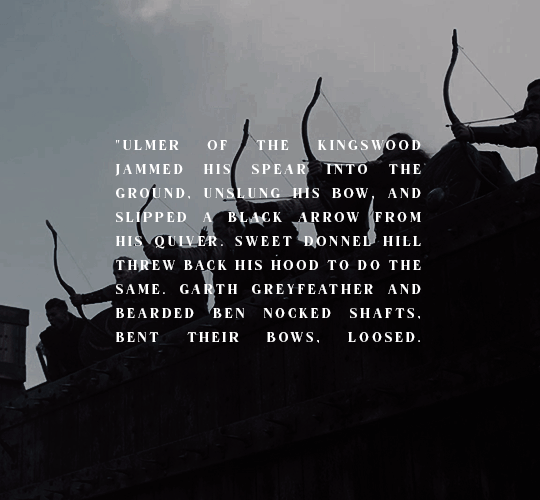

JONSNOWFORTNIGHTEVENT2023
DAY 6: SHADOWS OF HEROISM 🌑🌟
Defying King Stannis: Jon's Merciful Act Towards Mance Rayder (Unbeknownst to Jon, Actually Rattleshirt)
The horn crashed amongst the logs and leaves and kindling. Within three heartbeats the whole pit was aflame. Clutching the bars of his cage with bound hands, Mance sobbed and begged. When the fire reached him he did a little dance. His screams became one long, wordless shriek of fear and pain. Within his cage, he fluttered like a burning leaf, a moth caught in a candle flame.
Jon found himself remembering a song.
Ulmer of the Kingswood jammed his spear into the ground, unslung his bow, and slipped a black arrow from his quiver. Sweet Donnel Hill threw back his hood to do the same. Garth Greyfeather and Bearded Ben nocked shafts, bent their bows, loosed.
One arrow took Mance Rayder in the chest, one in the gut, one in the throat. The fourth struck one of the cage's wooden bars, and quivered for an instant before catching fire. A woman's sobs echoed off the Wall as the wildling king slid bonelessly to the floor of his cage, wreathed in fire. "And now his Watch is done," Jon murmured softly. Mance Rayder had been a man of the Night's Watch once, before he changed his black cloak for one slashed with bright red silk. - A Dance with Dragons - Jon III
As a sign of Jon's respect and compassion for "Mance", he defied Stannis's orders and commands his men to shoot "Mance" with an arrow, providing him with a more merciful death. This act reflects Jon's respect for Mance, despite their differences and the circumstances that led them to opposing sides.
By defying Stannis, Jon takes on the role of a compassionate leader who prioritizes empathy and dignity over blind obedience. It demonstrates his willingness to make difficult choices based on his own moral compass and personal connections, rather than simply following the commands of those in power.
In shooting "Mance", Jon not only ends the wildling leader's suffering but also allows him to die on his own terms, free from the prolonged agony of being consumed by flames. This act of mercy serves as a poignant moment that showcases Jon's capacity for empathy and his commitment to treating others with dignity, even in the face of opposition.
#Jon Snow#JonSnowFortNightEvent2023#GIF#ADWD#Mance Raydar#canonjonsnow#asoiafcanonjonsnow#Original Post#JonSnowEdit#asoiaf#asoiafnet
139 notes
·
View notes
Text


JON'S TENDER SIDE: GENTLE WITH HORSES
The mare whickered softly as Jon Snow tightened the cinch. "Easy, sweet lady," he said in a soft voice, quieting her with a touch. Wind whispered through the stable, a cold dead breath on his face, but Jon paid it no mind. - Jon IX, AGOT
When he crested a rise and saw the brown rutted kingsroad before him wending its way north through hill and plain, he patted the mare's neck and said, "Now all we need do is follow the road, girl. Soon the Wall." - Jon VI, ASOS
#Jon Snow#asoiafcanonjonsnow#canonjonsnow#asoiaf#valyrian scrolls#valyrianscrolls#ASOS#AGOT#a song of ice and fire#GIF#Original Post
218 notes
·
View notes
Text
Jon's Journey Through Melisandre's Visions



"A grey girl on a dying horse. Daggers in the dark. A promised prince, born in smoke and salt. It seems to me that you make nothing but mistakes, my lady. Where is Stannis? What of Rattleshirt and his spearwives? Where is my sister?" - Jon XIII, ADWD
It's fascinating to see that Jon narrates Melisandre's visions as they unfold in his life. Each part of her prophecy seems to play out for him. First, Alys Karstark's arrival matches the grey girl on the dying horse. Then, Jon experiences betrayal, mirroring the daggers in the dark. Now, with the possibility of Jon's resurrection, could the promised prince part of the prophecy be next?
#Jon Snow#Alys Karstark#Melisandre#Prophecy#GIF#ASOIAF#Original Post#ADWD#asoiafcanonjonsnow#The Prince That Was Promised#canonjonsnow#Speculation
48 notes
·
View notes
Text


“My own heroes are the dreamers, those men and women who tried to make the world a better place than when they found it, whether in small ways or great ones. Some succeeded, some failed, most had mixed results... but it is the effort that's heroic, as I see it. Win or lose, I admire those who fight the good fight.” ― George R.R. Martin
#Jon Snow#asoiafcanonjonsnow#canonjonsnow#Daenerys Targrayen#canondany#Parallels#Jon X Daenerys#ASOIAF#GIF#Original Post#GRRM
97 notes
·
View notes